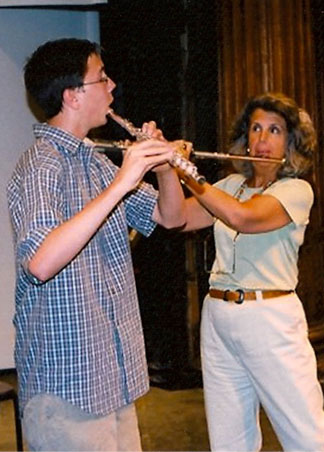Performance Tips in Competition
Comments to Kathleen Goll-Wilson, from Jeanne Baxtresser
Flute Talk—July/August 1999
In any competition, your performance represents a certain ten-minute period on a certain day, it does not define you as a player. Very possibly, if the same competition were held tomorrow, your playing would be different. It is important for students to remember this in any competition. Music is about competition. It is time to come to terms with competition so that you’re not defeated by a moment where you feel you haven’t been able to do your best, or perhaps you did your best but somebody else went further. So many variables in a competition are beyond our control. It’s almost an act of nature how things actually work out. I always tell my students to take out of the experience all that you’re able to; the more you take, the more resilience you have, the better you will be as a player. Remember, however, that it does not define you, it only means what you did in this ten-minute period on this day. Next week, who knows? If on certain days I was judged on performances I gave, and if all those performances were lined up one after the other, I would not be here today. Fortunately, good ones were interspersed with the others. Remember that each performance or competition is a rehearsal for the next one.
If you reach a wonderful moment, if your preparation is good, a sense of freedom is achieved on the stage when conscious thought is finished. Athletes call this getting in the zone, when thinking stops and the body just does, with mind and heart, what you wish it to do. This doesn’t always happen. Many times I felt like I was fighting myself, but we all work to raise ourselves above that, and it comes with great preparation. The great drama teacher, Stanislowski, said that the creative artist finds a conscious path, (that’s from practicing) to unconscious creativity. That’s the moment when you’re on stage and it just happens. All the intellect and analysis is there, but inspiration is the guide. We play to reach those moments.
In both competitions and auditions, it is crucial to have a good attitude. Nobody goes through a musical career without experiencing rejection. I have, and I don’t know a musician in the world who hasn’t, whether from a lost audition or ten auditions, or a terrible review, we all experience it. It’s how you deal with it and how you learn from it. I suggest keeping a diary. Keep track of what works and what doesn’t. Above all, keep a sense of humor about the whole thing. Humor helps us deal with stress and tension. Never lose your ability to laugh.


